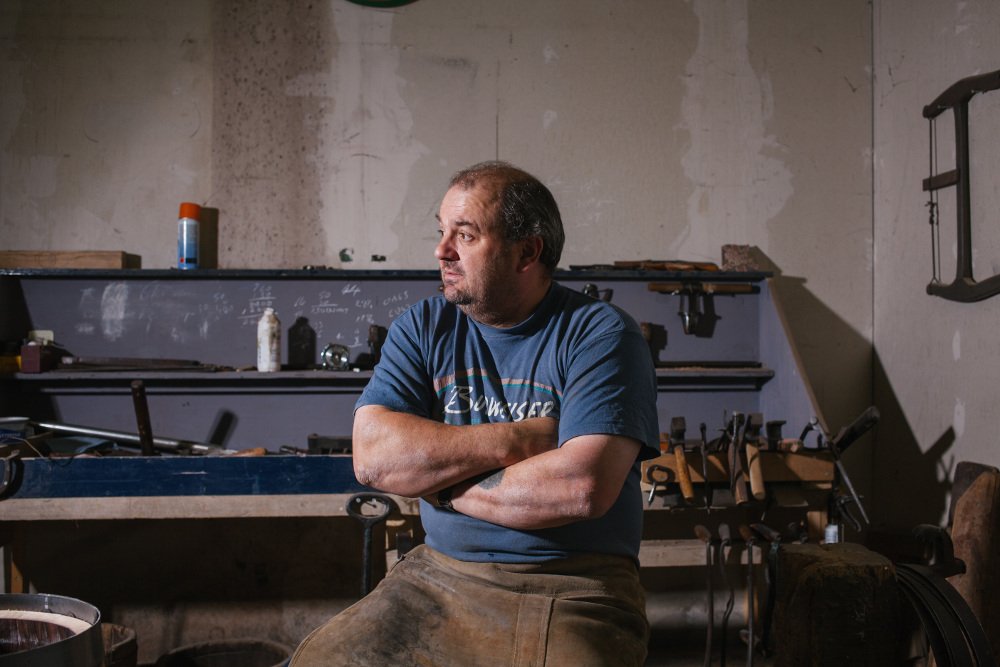
Alastair Simms - Britain’s Last Master Cooper
For the Redwing Post
The Redwing Post Meets Britain’s Last Master Barrel Maker
In the gently rolling hills of South Yorkshire, freshly harvested in the late August sunshine lays the White Rose Cooperage. The Parochialism of the landscape is only slightly dented by the strains of Black Sabbath's War Pigs floating through the door of the workshop that is home to Alistair Simms: Britain’s last Master Cooper.
The large, white washed workshop is filled with well worn tools, nails, tacks and the air has the familiar scent of sawdust. Alistair stands in the middle of it, a man who can clearly move a barrel with a gruff Yorkshire drawl but a surprisingly sunny disposition. His hands show the ware of several decades of woodworking, splinters dotting his hand like sparse trees. Staves, the slats which make up a barrel are lined up along the wall and barrels in various states of completion and various states of ware fill most of the rest of the space. The workshop is not only for creating new barrels but also to resize older barrels which have previously been used to store wines, sherry's or ports. The hope of course is that these barrels flavour their new payload.
Located a stones throw from York, the White Rose Cooperage is something of a last man standing. Although in the early 1900s a cooper could be found in every town in the U.K, as attested to by the paucity of the surname, the call for barrels is not what it once was. A switch to cheaper aluminium barrels in the sixties prompted many to see it as an industry on the terminal wane. According to records at the University of Reading in 1889 Bass's Brewery employed four hundred coopers. Today breweries employ just four with Alistair the only master cooper among them.
The decline in people wanting to become Coopers may be slightly explained by the difficulty of the task: Alistair himself started his apprenticeship at the age of 16 at Weston Brewery, a task which was to last fifteen years until he received the title of Master Cooper. The length of apprenticeship may seem excessive but is reflective of the difficulty of craft. Traditionally there are three different types of coopering, Dry coopering, making casks or other containers for transporting dry goods, White coopering for objects that need to be watertight but not durable for transport such as buckets and then Wet Coopering, the most challenging of the three. A proper cask, barrel is actually a unit of measurement, is made with no glue and no waterproofing material, it is exclusively wood and metal hoops but must stay completely watertight and survive rough transport.
The process looks fairly simple from the outside although the level of precision to make casks waterproof mean it is anything but. The staves are cut down and resized to be a uniform size and then placed in the anchoring hoop, they then need to be heated to steam the wood to make it pliable. A second, slightly bigger hoop is slipped down to start to give the barrel it's rounded shape. The cask then needs to be pulled in from the other end to allow the second two hoops to be attached. This is done by tightening the barrel using rope on the other end and sliding the hoops over and hammering them down into position.
Fortunately the increase in craft brewery as well as English wine making has seen a revival in demand for wooden barrels and an increased interest in the craft. After several years of waiting Alistair now has an apprentice and feels buoyant for the future. It may have taken a long while for people to re appreciate coopering but the difference in taste between an ale in a wooden cask and one in aluminium is stark. It was mainly disputes between the breweries and the coopers which led to Aluminium being used in the first place even though the breweries knew that the taste would suffer. Fortunately it now looks like instead of mourning the death of another craft we can toast to its revival.